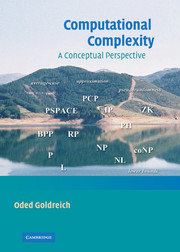Book contents
- Frontmatter
- Contents
- List of Figures
- Preface
- Organization and Chapter Summaries
- Acknowledgments
- 1 Introduction and Preliminaries
- 2 P, NP, and NP-Completeness
- 3 Variations on P and NP
- 4 More Resources, More Power?
- 5 Space Complexity
- 6 Randomness and Counting
- 7 The Bright Side of Hardness
- 8 Pseudorandom Generators
- 9 Probabilistic Proof Systems
- 10 Relaxing the Requirements
- Epilogue
- Appendix A Glossary of Complexity Classes
- Appendix B On the Quest for Lower Bounds
- Appendix C On the Foundations of Modern Cryptography
- Appendix D Probabilistic Preliminaries and Advanced Topics in Randomization
- Appendix E Explicit Constructions
- Appendix F Some Omitted Proofs
- Appendix G Some Computational Problems
- Bibliography
- Index
Appendix A - Glossary of Complexity Classes
Published online by Cambridge University Press: 05 June 2012
- Frontmatter
- Contents
- List of Figures
- Preface
- Organization and Chapter Summaries
- Acknowledgments
- 1 Introduction and Preliminaries
- 2 P, NP, and NP-Completeness
- 3 Variations on P and NP
- 4 More Resources, More Power?
- 5 Space Complexity
- 6 Randomness and Counting
- 7 The Bright Side of Hardness
- 8 Pseudorandom Generators
- 9 Probabilistic Proof Systems
- 10 Relaxing the Requirements
- Epilogue
- Appendix A Glossary of Complexity Classes
- Appendix B On the Quest for Lower Bounds
- Appendix C On the Foundations of Modern Cryptography
- Appendix D Probabilistic Preliminaries and Advanced Topics in Randomization
- Appendix E Explicit Constructions
- Appendix F Some Omitted Proofs
- Appendix G Some Computational Problems
- Bibliography
- Index
Summary
Summary: This glossary includes self-contained definitions of most complexity classes mentioned in the book. Needless to say, the glossary offers a very minimal discussion of these classes, and the reader is referred to the main text for further discussion. The items are organized by topics rather than by alphabetic order. Specifically, the glossary is partitioned into two parts, dealing separately with complexity classes that are defined in terms of algorithms and their resources (i.e., time and space complexity of Turing machines) and complexity classes defined in terms of non-uniform circuits (and referring to their size and depth). The algorithmic classes include time complexity classes (such as P, NP, coNP, BPP, RP, coRP, PH, ε, εχP, and NεχP) and the space complexity classes, ℒ, Nℒ, Rℒ, and PSP ACε. The non-uniform classes include the circuit classes P/poly as well as NCk and ACk.
Definitions (and basic results) regarding many other complexity classes are available at the constantly evolving Complexity Zoo.
Preliminaries
Complexity classes are sets of computational problems, where each class contains problems that can be solved with specific computational resources. To define a complexity class one specifies a model of computation, a complexity measure (like time or space), which is always measured as a function of the input length, and a bound on the complexity (of problems in the class).
Information
- Type
- Chapter
- Information
- Computational ComplexityA Conceptual Perspective, pp. 463 - 468Publisher: Cambridge University PressPrint publication year: 2008
